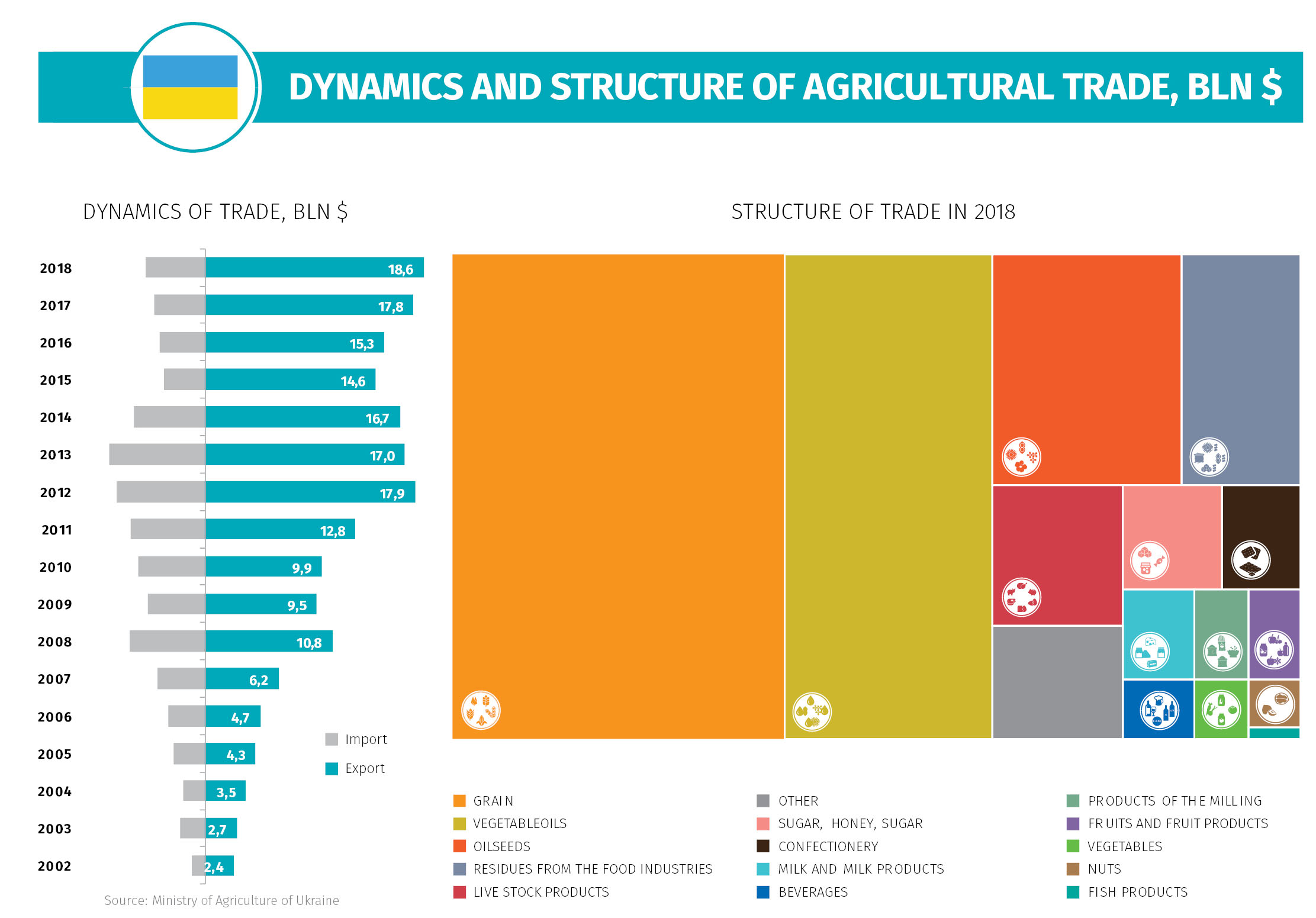Editor’s Note: Our latest Legal Quarterly magazine is out. Get a PDF version online or pick up a copy in Kyiv.
Small and medium enterprises, abbreviated as SMEs, are the backbone of any successful free-market industry, including Ukrainian agriculture.
But Ukraine’s agricultural SMEs lag far behind their European Union counterparts due to a number of serious challenges, including limited affordable financing and low levels of technological literacy. That hinders their growth and influence in legislative decision-making, providing more room for large agro-holdings to dominate the agricultural economy.
Changing this will require significant efforts from the SMEs to become more competitive, productive and attractive, experts say.
But it will also likely require the government and international organizations to do more to help the enterprises realize their full potential.
Statistics
Overall, Ukraine has about 43,000 farmers, of whom 33,000 are active, according to Ukraine’s Ministry of Agriculture. And out of these 33,000 private farmers, roughly 80 percent are small farmers with 500 hectares or less, according to the ministry.
In 2017, SMEs made up 20 percent of Ukraine’s gross domestic product (GDP), according to the European Union’s EU4Business. In Germany, SMEs constituted 55 percent of the country’s GDP during the same period, according to Germany’s Ministry of Economic Affairs and Energy.
This gap can be explained by the productivity of Ukrainian companies, which is “25 to 40 percent lower than in European companies,” according to
Dmytro Lyvch, a consultant at Ukrainian policy think tank EasyBusiness in Kyiv.
Financing
The economic environment in Ukraine for agricultural SMEs might not be wholly positive, but at least it is “favorable,” says Oksana Chernozub, head of SME product development from Crédit Agricole, an international bank that specializes in agricultural loans in Ukraine.
Despite Ukraine’s high interest rates of nearly 17.5 percent, contrary to popular belief it is not so difficult to obtain a loan, according to Chernozub.
And the experience itself could be beneficial, especially for those who do not meet the eligibility standards, as it helps applicants to see what they need to improve in order to make their businesses more attractive.
“The questions asked are quite beneficial… it is like a self-check,” Chernozub said.
Chernozub says that SMEs include businesses of various sizes, knowledge and capacities.
“Those who have 10 hectares and those who have 100 hectares… they are both SMEs but do not possess the same level of financial knowledge,” Chernozub said.
Companies that are experienced enough and demonstrate honesty in their financial records usually do not have any issues obtaining loans when needed. Crédit Agricole works with companies that own a minimum of 200 hectares, specifically because it is easier to work with companies that keep better records.
“It is more difficult for any smaller company to obtain a classic loan, but the customer can always apply, or go to the supplier and ask for a differed payment,” which would allow small enterprises to develop their business incrementally, Chernozub said.
“The key to ease access to financing would be to increase their financial knowledge… and awareness that they should be thinking more like a legal entity rather than a private individual.
“When it comes to small companies in general, Ukraine does not have a culture of financing SMEs… by government or financial institutions.”
The current effective interest rate for agricultural loans to SMEs in Ukraine is 20 to 21 percent, much “higher than in Europe,” Chernozub conceded.

Of Ukraine’s 33,000 private farmers, roughly 80 percent have 500 hectares or less, according to the Agricultural Ministry. (Volodymyr Petrov) (VOLODYMYR PETROV)
Technology
In today’s digital age, one of the main contributors to an enterprise’s success on both national and international markets is its “ability to develop and implement innovations,” said Lyvch.
According to him, Ukrainian SMEs do not pay enough attention to research and development.
“Only 3.5 percent of Ukrainian SMEs invest in it, comparing to 9.9 percent for European SMEs.” This could also be explained by a lack of financial resources, Lyvch said.
Lyvch emphasized the need for SMEs to hone their skills in information technology in order to optimize their communication with partners and customers as well as to increase their efficiency.
According to him, “only 55.6 percent of Ukrainian SMEs have their own website, compared with 63.6 percent of European SMEs,” which limits the ability of Ukrainians to “internationalize their activities and integrate themselves into the EU’s value chains.”
Lyvch believes that, in order to cope with these issues, SMEs should receive more financial support as well as assistance from consultants who can help them navigate today’s numerous challenges.
This would help them to develop their own technologies and ease communication between Ukrainian SMEs so that they can share technical solutions with each other.
Knowledge
Whether it is about finance or technology, it all boils down to two things: knowledge and effort.
Knowledge is by far one of the most important factors in order to help Ukrainian SMEs to grow, but there needs to be a desire to acquire the necessary knowledge in order to grow one’s business.
Too often, SMEs do not seem to know how to obtain key information about existing opportunities, potential clients, or general knowledge about the market that would help them increase the attractiveness of their companies.
Lvych says that grants and many international technical assistance projects by various European commissions are available, but Ukrainian SMEs have never heard of them and don’t’ know how to apply.
“The level of access to info and communication on those grants is crucial,” he said.
When it comes to acquiring knowledge, both Lyvch and Chernozub agree that Ukrainian SMEs must make the necessary efforts in order to hone their skills.
“They should understand that if they want to grow their business, they need to put personal efforts into education for finance…,” Chernozub said. “Knowledge is accessible… (but) many companies are not making the necessary efforts.”

Long-term constraints
But SMEs are not responsible for all their issues.
Backwards legislation and a lack of trust are also making the business environment for Ukraine’s agricultural SMEs tougher than in more developed countries.
Chernozub says that “companies should be encouraged to cooperate and form clusters at the regional level… it doesn’t cost anything.”
However, EasyBusiness interviewed hundreds of agricultural SMEs and found that the level of trust is too low.
According to Lyvch, SME owners “don’t believe in partnership or trust each other… but in order to increase your capacity you need to find partners… to attract investment and improve your skills on the market.”
There must be “structural reforms, farmland market reforms, privatization and (an increase in) the index of economic freedom,” he says.
Example to follow
But Natalia Sudarkina, co-owner of Agro-Patriot, an Odesa-based agricultural SME that produces garlic, says that it is still possible for an SME to be successful.
Founded in 2008, Agro-Patriot went from only one hectare 10 years ago to 200 as of 2019. The company managed to do exactly what Chernozub and Lyvch advise SMEs to do, which is bring producers together in order to form a larger more attractive group.
As a result, today Agro-Patriot assembles over 20 garlic farmers and has successfully built the first garlic storage in Ukraine, with a capacity of 1,000 tons.
Sudarkina was happy to tell the Kyiv Post that they “received this year the (American) Global Good Agricultural Practices certification and passed the Walmart audit.”
The company produces for both domestic and international markets.
“This year we exported our garlic to Canada, Poland, Germany, Great Britain and others… 80 percent we sell in Ukraine (whereas) 20 percent goes to export,” Sudarkina said.
Of course, the path to success is not easy, she said.
The top problems in Ukraine are the absence of a fair judicial system and the lack of financing for SMEs.
“It’s the main problem for SMEs in Ukraine. That’s why we do not grow as quickly as we would like to… I see lots of opportunities for doing business in our country, but it’s rather difficult to implement without affordable financing,” she said.
But Sudarkina remains positive.
“We believe in our idea and work hard every day,” she said.
